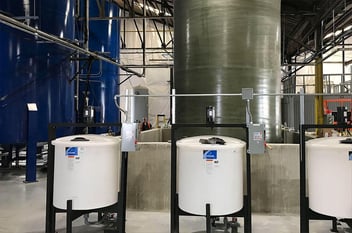So long as something is made, byproducts and waste will be a consequence. Thermodynamics generally dictate that natural systems tend toward disorder and therefore the production of some valuable product or “highly ordered thing” means that there will be a consequence imposed by mother nature. It’s her way and she doesn’t care to debate it!
Oftentimes, the consequence of production is a waste or rinse stream that includes metals, oils and/or various other organic constituents. In some cases, these streams may be considered byproducts, which implies there is value in the constituents in these streams, if only they can be removed cost-effectively.
The value of recovered constituents can generally be divided into two classes. They may be valuable in a so-called captive market – meaning reusable within the source operation itself, or external – which means the recovered constituent may be repurposed in external markets. In the former case, it is clear what quality and/or purity the recovered constituents need to be because, after all, the facility that is generating the byproducts knows what feedstocks are needed to produce their core products. Failing the ability to recover in a captive manner, however, it becomes a bit more difficult to determine if the byproducts are usable by someone else.
Industries tend to “run in packs” and that can mean for example, that a durable goods industry producing finished metal for automotive, or appliance use may not be aware of how their byproducts could be used in other industries like petrochemical, refining, chemicals, or mining. Optimizing the possibility of repurposing recovered constituents can be fostered by engaging with consultants or service providers that have more general knowledge of multiple industries and their needs with respect to feedstocks and commodities. Innovation does not always mean reinventing the wheel, but rather recognizing an opportunity to link industries in a synergistic manner. A problem as seen by one can become a solution for another.
Without the ability to recover any valuable constituents, there is also the unfortunate possibility that the waste streams generated by the source operation do not contain any constituents of value at all and need to be properly treated for discharge and/or disposal under applicable environmental regulations. That does not mean it will remain the case in perpetuity, so it is important to stay vigilant in assessing opportunities to recycle and reuse as new market opportunities present themselves.
At some point, the question must be answered - what do you do with your waste streams?
Given the myriad of industries that generate byproduct and wastewater streams and the challenge associated with proper management of their various constituents, this simple question often leads to a complex quandary of considerations. Arriving at the best solution will require a practical examination of the following items:
- Competency - Given that we make “X” as our core product (competency) but produce byproducts “Y” and “Z”, do we have the necessary internal subject matter experts and skills to manage these Y and Z streams in a self-sufficient manner?
- Resources – If we have the skills to manage the byproduct streams, is the capital and operational costs associated with doing so attractive vs. delegating their management to third parties with more integrated centralized wastewater treatment (CWT) capabilities?
- Reliability – If we elect to delegate to a third-party CWT, can we find one with services that are robust, reliable, and with a demonstrated track record? Can we ensure our operation is not at risk should they fail to deliver?
- Environmental – Can we be certain that the contaminants are going to be properly and responsibly managed so that even if they are treating the streams in compliance with environmental regulations, the facility will not endure ramifications of improper management, sale or reuse?
- Future-Proof – Is the CWT service provider staffed and supported by industry-recognized subject matter experts so that they can respond if or when my operation changes and the nature of the wastewater or byproduct stream also changes? Are they a partner that can future-proof my dependence on them?
In spite of having over 20 CWT facilities across the USA with the ability to treat and recover metals, oils and other byproducts with complementary wastewater treatment and discharge capabilities (under associated industrial pretreat subcategory permits), Valicor recognizes that the challenges with each customer are often unique and require site-specific understanding and analysis to ensure the best solution is provided.
Having been in this business for over 40 years, we recognize that industries are evolving and the challenges to improve efficiency, reduce costs and manage utility and commodity resources that have been taken for granted in the past (air, water, land) is no longer a viable strategy.
Stay tuned as we dive further into the above items in future posts so that you can arrive at the best solution for your business. If you have any questions or would like additional information, please don’t hesitate to contact us.



